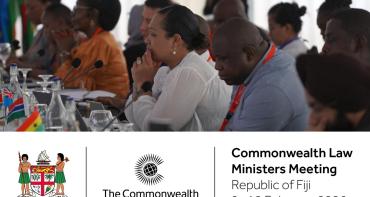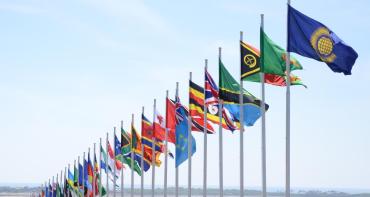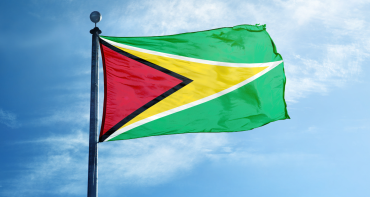Speaker: Commonwealth Secretary-General Kamalesh Sharma
Chancellor, Chairman of the Board of Directors, Rector, Graduates, Distinguished Guests, Ladies and Gentlemen...
The National University of Rwanda does me an honour in conferring upon me this honorary doctorate. It is also a signal way of marking the ever-strengthening ties being developed between Rwanda and the other 53 members of our Commonwealth family of nations, and I take this as an honour addressed in a greater measure to that organisation and family of nations.
We are a Commonwealth bound ever closer together by values and principles. This is the special richness that we share with one another and, in turn, impart to the wider world, through what I see as our global wisdom function. Centres of scholarly excellence such as this have a role to play in contributing to that wisdom.
As the newest member of the Commonwealth, Rwanda has very quickly become a committed participant at the intergovernmental level, and the people of Rwanda are now weaving themselves into the networks and alliances that are amongst the many benefits and opportunities opened by membership.
This year, our Commonwealth theme is ‘Connecting Cultures’, and those people-to-people links take on a special significance. The theme reminds us of the special opportunities we have to celebrate an extraordinary cultural tapestry that spans the globe and reflects our many individual and collective identities.
There is nothing the Commonwealth treasures more than its respect for diversity. But ‘Connecting Cultures’ is about more than observing and celebrating others and the ways in which they express themselves. It is also about exploring how we can bring cultures together, how we can connect them in order to learn, to deepen the understanding we have of one another, and to build bridges.
Our approach is also to draw on a multiplicity of networks and resources, always seeking to make the best use of any means available, to advance towards our goals. We may rely on ministers, or officials, or any of our ninety or so Commonwealth professional associations, or civil society at large, or on any combination of these.
The Commonwealth has always shown an unerring knack for avoiding sterility in its deliberations. It works to create common ground on practical ways forward, and of steadily but surely raising collective expectations in promoting adherence amongst ourselves to our shared values. We are committed to a continual deepening and strengthening of our work to advance all three of the ‘Ds’ that guide us: democracy, development and diversity.
An example of this was the seminal contribution of the Commonwealth Commission on Respect and Understanding, set up to look into the causes of conflict, violence and extremism in our societies. No country could value that work more than this country.
The Commission’s report, Civil Paths to Peace, focuses on the problem of group-based violence and its impact on communities. The report concludes by advocating solutions based on the multiple identities of individuals. This new approach to looking at violence and how it is manifested marks a departure from cultural or civilisational explanations of conflict and terrorism.
Civil Paths to Peace argues that solutions to conflicts should be rooted in the Commonwealth’s core values and principles, including human rights, democracy, gender equality, the rule of law and a transparent and accountable political culture.
Crucially, it argues that we must not see the world or each other through any one single narrow lens: we must not label others according simplistically to their religion, or ethnic group or nationality as if somehow they have no other meaningful identity. As one of the authors of that report recently wrote, ‘the same person can be, without contradiction, a South African citizen of Asian origin, a Christian, a socialist, a woman, a vegetarian, a jazz musician, a doctor, a feminist, a heterosexual, and a believer in gay rights.’ To that, one might add that the person believes the most important problem to address today is to ensure her favourite football team wins the African Cup of Nations.
Our challenge, as human beings, is to recognise and respect this complexity, this multi-layering, and to find the common points of intersection on which we can build understanding and mitigate the risk of conflict.
Democracy, which has been called “government by discussion”, is a core value of the Commonwealth - and to our way of doing things. It is a process of collective reasoning that brings more information, more perspectives and more voices to the table.
It is also of its essence an inclusive process that sees each individual as having a contribution to make to the good of the whole. It brings accountability by voicing continuous assessments about how a society and its members are doing.
Our commitment to dialogue and discussion, and our desire to keep channels open, extends to our mode of engaging when member states are seen to be challenged by the standards to which we are committed in the Commonwealth. Our preference is always for the helping hand and not the wagging finger.
Decisions made at the recent Commonwealth Heads of Government Meeting (CHOGM) – including President Kagame - will help us to be even more engaged constructively. Last year’s CHOGM in Australia will long be remembered for the renewed impetus and sense of urgency it gave to reform, renewal and consolidation of our values.
A capacity for long-haul and patient engagement – often conducted behind the scenes and without fanfare – is one of our unique and great strengths.
The Commonwealth also attaches great importance to human rights, encouraging member countries to uphold obligations under international law, the international conventions to which they are signatories, and the many of our own declarations to which they have subscribed.
The comparative advantage of being able to draw together a group of nations so diverse, and yet with a shared sense of belonging and values and a commitment to universal global welfare, is our greatest attribute.
In a compacting world, tolerance and understanding, shared approaches and mutuality, an attitude of embracing difference and diversity become ever more important. Rwanda is known to us in the Commonwealth as a country that is committed to our values, and that is willing to contribute and to participate actively. This is warmly welcome. And I look forward to the day when we will have not one but several graduates of the National University of Rwanda on our Secretariat staff to make their own personal contributions and to take forward the practical application of our ideals and this vision.
I spoke of a compacting world. It is one in which the voices of the voiceless must be heard. To that end, the Commonwealth together with La Francophonie, has become a conduit through which the priorities of small states and vulnerable states can be conveyed to the G20. Our bridging role in expressing at the G20 table, representing around 90% of global GDP, the concerns of the 90% of the world's countries which do not have a seat at that table is increasingly important. The G20 needs to regard itself as the ‘T20’, trustees of the wider world, or there will be a danger of its work lacking sustainability or global credibility.
With massive international aid shortfalls, innovative funding options need to be identified. Key issues that we have brought to the G20 table on behalf of small states and vulnerable states are: trade; debt; financial inclusion; growth with resilience; maternal health; and, innovative financing for development.
I recently attended the annual awards ceremony of the Mo Ibrahim Foundation, a highly respected and independent institution monitoring a range of good governance indicators in African countries. It is notable that, last year, seven out of the top ten – indeed top eight – countries in the ranking were Commonwealth countries, and there were no Commonwealth members in the bottom ten. This cannot happen by accident. It is the result of long and steady sedimentation of Commonwealth values in our member states. This is one of the many benefits the Commonwealth brings to Africa; it is part of the global value to which I referred earlier.
It is through innovative and aspirational reform and by rising to the challenge of a transforming world that the Commonwealth, in its many manifestations, shows a resilience and vitality that will, I am sure, continue to demonstrate its ability to make contributions of enduring and global value. We are delighted that the people of Rwanda share with us in this great endeavour. And I am particularly pleased that this distinguished university is also now so firmly and clearly an integral part. And I hope some of you will succeed in competing for Commonwealth Scholarships and Fellowships.
In concluding, I renew my sincere personal thanks together with those of the wider Commonwealth, whose values, principles, rich diversity, ideals and goals are reflected and honoured also.
Graduands, a final word to you, as Chancellor of another university. Today is one of the most important days of your life, when you step out into the world. You are fortunate in having passed through a great national university. Go forward with self-belief and high values in building your lives and careers, in building your nation, and as world citizens. I wish you success and good fortune.



